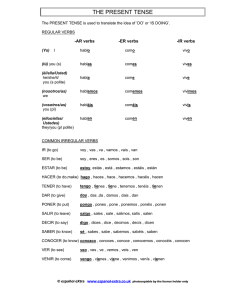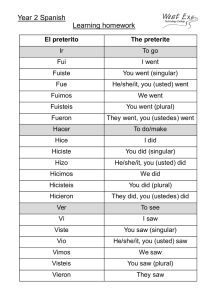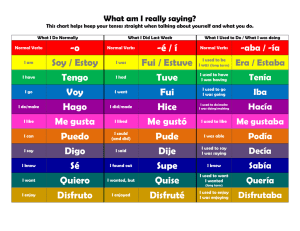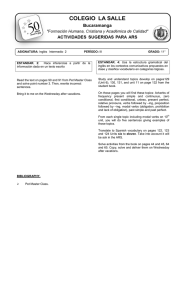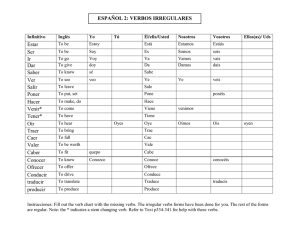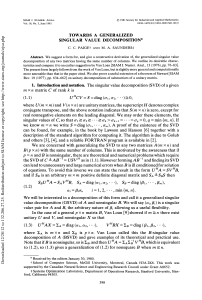IMPERATIVES In order to want to tell someone to do something
Anuncio
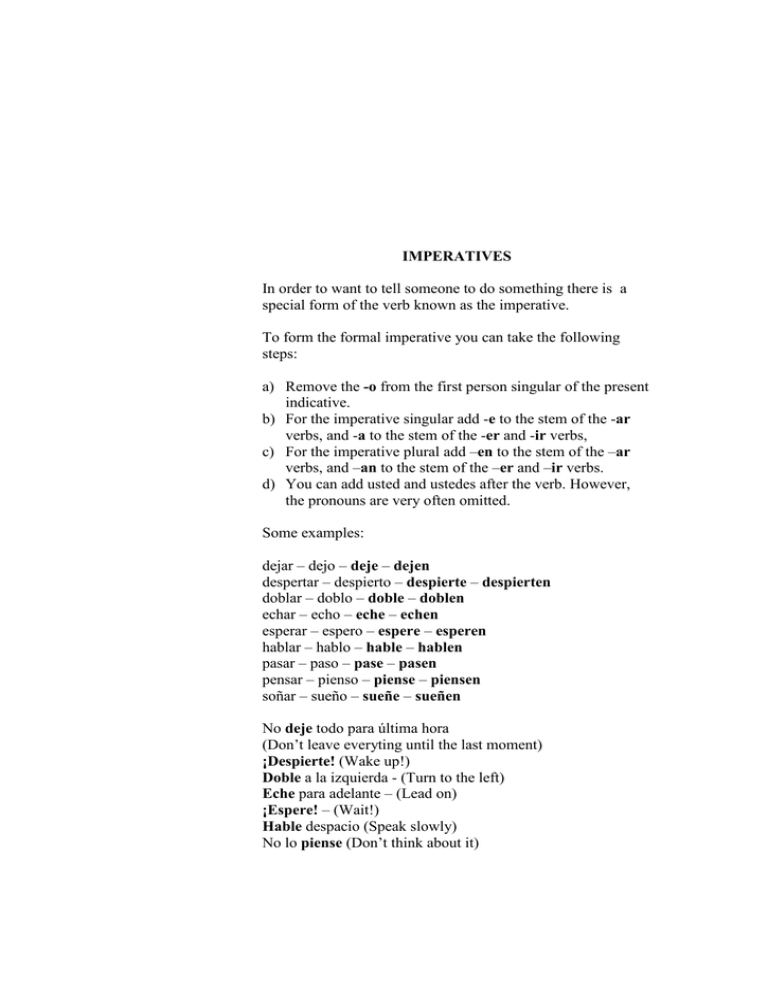
IMPERATIVES In order to want to tell someone to do something there is a special form of the verb known as the imperative. To form the formal imperative you can take the following steps: a) Remove the -o from the first person singular of the present indicative. b) For the imperative singular add -e to the stem of the -ar verbs, and -a to the stem of the -er and -ir verbs, c) For the imperative plural add –en to the stem of the –ar verbs, and –an to the stem of the –er and –ir verbs. d) You can add usted and ustedes after the verb. However, the pronouns are very often omitted. Some examples: dejar – dejo – deje – dejen despertar – despierto – despierte – despierten doblar – doblo – doble – doblen echar – echo – eche – echen esperar – espero – espere – esperen hablar – hablo – hable – hablen pasar – paso – pase – pasen pensar – pienso – piense – piensen soñar – sueño – sueñe – sueñen No deje todo para última hora (Don’t leave everyting until the last moment) ¡Despierte! (Wake up!) Doble a la izquierda - (Turn to the left) Eche para adelante – (Lead on) ¡Espere! – (Wait!) Hable despacio (Speak slowly) No lo piense (Don’t think about it) hacer – hago – haga – hagan perder – pierdo – pierda – pierdan tener – tengo – tenga – tengan volver – vuelvo – vuelva – vuelvan decir – digo – diga – digan dormir – duermo – duerma – duerman salir – salgo – salga – salgan ¡Hágalo! (Do it!) Object pronouns always follow and are attached to the affirmative imperative. ¡No lo haga! (Don’t do it!) In the negative imperative, object pronouns always, immediately, go before the verb. No pierda más tiempo ( Don’t waste any more time) Tenga cuidado (Be careful) Vuelva mañana (Come back tomorrow) ¿Dígame? (Hallo?) When answering the telephone. Duerma bien (Sleep well) Irregular imperatives: dar – dé – den; estar – esté – estén; ser – sea -- sean; ir – vaya – vayan. Déme la cuenta (Please, give me the bill) Sea justo (Be just) Vaya a casa (Please, go home) In order to instruct someone you know to do something, change the usted forms, in the singular affirmative imperative, as follows: a) For the tú form of the verbs ending in --ar , change the –e into –a. Espere (usted) un momento – Espera un momento. b) For the tú form of the verbs ending in --er and --ir, change the –e into –a. Llame (usted) un taxi – Llama un taxi. c) There are some irregular verbs: decir – di – ¡Dilo! (Say it!) hacer – haz – ¡Hazlo! (Do it!) ir – ve – Ve y vuelve pronto (Go and return soon) oír – oye – ¡Óyeme! (Listen to me!) poner – pon – ¡Pon la mesa! ( Set the table!) ser – sé – ¡Sé generoso! (Be generous!) tener – ten – ¡Ten paciendia! (Be patient!) traer – trae – ¡Trae el libro! (Bring the book!) venir – ven -- ¡Ven aquí! (Come here!) For the singular negative form for ‘tú’ add –s to the singular usted form of all the verbs: No hables con la boca llena (Don’t speak with your mouth full) ¡No lo digas! (Don’t say it!) ¡No vayas ¡(Don’t go!) Si no conviene, no lo hagas; si no es verdad, no lo digas. (If it is not advantageous, don’t do it; if it is not true, don’t say it) Marco Aurelio (121 A.D. – 180 A. D.) For the informal affirmative imperative in the plural, change as follows: For all the verbs ending in –ar, -er and –ir, drop the –r and add the consonant –d. Educad a los niños y no será necesario castigar a los hombres. (Bring your children up properly and you won’t need to punish men) Pitágoras (570 B.C. – 495 B.C.) Para dialogar, preguntad primero, después... escuchad. (For conversing, first, ask; then... listen.) Antonio Machado (1875 -- 1939)
